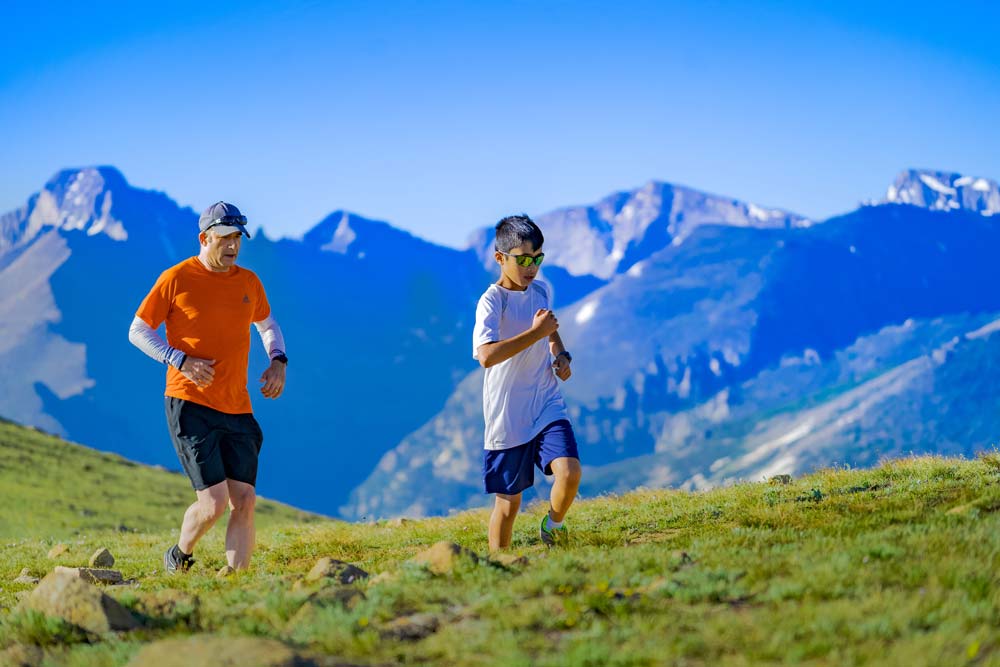Who can resist the lure of lacing up in the great outdoors? You don’t need a degree in ecopsychology to appreciate the dopamine-fuelled rush of trading your treadmill for the countryside or coastline. Just 20 minutes in the great outdoors is proven to significantly lower levels of stress hormones, research published in Frontiers found, making a micro-dose of nature the easiest way to boost your wellbeing during the working day.
The pandemic has only cemented nature’s role as an antidote for modern living. Through 18 months of lockdowns and social distancing restrictions, the human need for nature – and the pernicious impacts of its absence – became clearer than ever. With gyms and fitness centres closed, the well-trodden paths of our local parks became integral to the nation’s wellbeing.
‘Spending time in nature and the great outdoors can have excellent benefits for our mental health,’ says Dr Katherine Kennet, of the Royal College of Psychiatrists. ‘It helps us to find rest from our worries and can help prevent mental illness, while also aiding people who are either unwell or in recovery. Lockdowns have shown just how important it is to be outside and have access to green spaces, and how difficult it is for people who are unable to do so.’
We have become used to thinking we need to travel to experience nature, largely because so little of the great outdoors is accessible to the public. Just eight per cent of the English countryside is open for people to freely run (or roam) across, leaving the remaining 92 per cent – equivalent to hundreds of thousands of acres of woodland, meadows and rivers – out of reach.
It’s an issue Nick Hayes, illustrator and author of The Book of Trespass, and Guy Shrubsole, environmental campaigner and author of Who Owns England?, are working hard to change. Through their Right to Roam campaign, the duo hope to broaden the existing legislation around access rights and, in turn, open up England’s countryside to the public. Speaking to Hayes, we discover why the current system is ripe for change – and speak to scientists about the many benefits associated with training on the road less travelled.
What are the current rules?
It mightn’t feel like it sometimes, but England is surprisingly green. Just nine per cent of the country has been built upon, with the rest of land comprising countryside, farmland and ‘natural spaces’ such as forests and grasslands. Despite such a wealth of nature on the nation’s collective doorsteps, the vast majority is closed off to its millions of inhabitants. In 2000, the Countryside & Rights of Way (CRoW) Act granted Brits the ‘Right to Roam’ across a meagre eight per cent of the English countryside.
Since these sites are usually isolated and hard to reach, ‘access to land has become a postcode lottery, available to those who live next to it, or who can afford the cost of travel and overnight stays’, say the team. ‘Everywhere else, not covered by the CRoW Act, the public are actively made to feel unwelcome in our own landscape and have been portrayed for centuries as a threat to the countryside.’ Crossing the boundary is considered trespassing.
‘Hang on’, you’re thinking. ‘What’s Right to Roam?’. A long-standing custom in countries such as Sweden, Norway and Scotland, it grants the public access to land, lakes and rivers, even if they’re privately-owned. There are still privacy rules in place to protect landowners, of course – in Sweden, for example, you can’t venture within 70 metres of a dwelling or garden. But there’s a difference between scaling the fence of someone’s back garden and logging a few morning miles on the outskirts of a duke’s 13,000-acre estate, and where the Right to Roam allows for this crucial distinction, England’s current legislation does not.
Tearing down the barbed wire fence would have a profound effect on our collective experience of – and relationship to – the natural world around us. ‘Nature has the capacity to heal us,’ says Hayes. ‘The science has proven how regular access to nature can improve our mental and physical health, and NHS Forest has estimated that we spend £8.2 billion dealing with our sedentary lifestyles; money that could be saved by allowing people access to the nature on their doorstep – our rivers, woodland and Green Belt.’
Just as important, extending the act could reinvent our relationship with nature, Hayes explains. ‘When we lost our right to access the countryside, we also lost our right to defend it,’ he says. ‘The Right to Roam legislation across Europe codifies the very specific responsibilities we have – not just to the ecology of the land, but to the people who live and work on it.’ The more time we spend in the wilds of England, the better equipped we are to interact with the natural world – and the more impassioned we become about protecting it.
‘By encouraging people towards nature, we will not only be teaching them the responsibilities we owe to it, not only be fostering a visceral, meaningful love and care for it, but also widen the scope of citizen science or the monitoring of invasive species,’ Hayes continues. ‘Science relies upon the data that people upload about wildlife diversity, but if we’re only allowed access to eight per cent of England, how can we provide accurate data? A greater connection to nature will enable us to protect it in ways that landowners have not.’
The original version of this article was originally published on Runners World by Annie Hayes.
At LCC we have a dedicated and highly skilled team ready to help you. If you are struggling with your mental health, we offer low-cost counselling services in Letchworth, for those who struggle with affordability.





